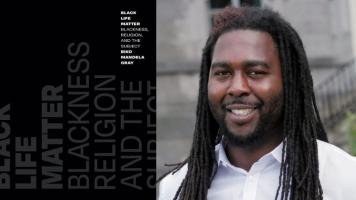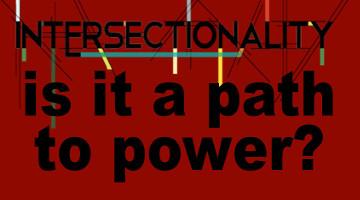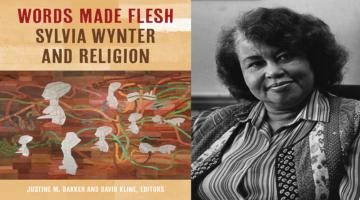This week we take a longer look down the deep hole that is the most popular flavor of intersectionality.
When I took a swipe at intersectionality last week, declaring that it was a hole, that afro-pessimism was a shovel and it was high time to stop digging, some friends and comrades were displeased. As far as they were concerned, questioning intersectionality amounted to a frontal attack on the place of women in the struggle against capital, patriarchy, white supremacy and empire, utterly inconsistent with my own politics and that of Black Agenda Report. I also threw some rocks at afro-pessimism, which I labeled the nappy headed step child of intersectionality, to the disappointment of its defenders, some of them friends and comrades too. Additionally neither group admits to understanding why I lumped them together, so I’m taking this opportunity to clarify both critiques and what joins them.
"The second intersectionality according to Smith, is rooted in post-structuralism which categorically rejects socialism and class analysis..."
Intersectionality is a termed coined by California law professor Kimberlé Crenshaw in 1989 in her attempt to convince her fellow officers of the court to refine anti-discrimination law by incorporating the recognition of multiple overlapping oppressions into anti-discrimination law. While the term hasn’t made much headway the last three decades in the arguments of lawyers or the decisions of judges, it’s become a pervasive buzzword with multiple meanings in the realms of politics and the nonprofit industrial complex.
Nowadays, and perhaps from the start, as Sharon Smith explains in an indispensable August 2017 Socialist Worker article titled “A Marxist Case for Intersectionality,” there are two separate, distinct and mutually incompatible intersectionalities. The first, she says is firmly in the camp of the real left, those who oppose and aim to overthrow capitalism, patriarchy, white supremacy and empire – not two or three out of four but all four. This tradition, which puts intersectionality in the context of class analysis and class struggle goes back at least to Claudia Jones in the 1930s, 40s and 50s, and the Cohambee River Collective in the 1970s, although neither of these ever heard or uttered the word “intersectional.” The second intersectionality according to Smith, is rooted in post-structuralism which categorically rejects socialism and class analysis, and either downgrades the importance of class struggle at most to something coequal in importance with ageism, ableism and speciesism. With no anchor in class struggle, and emphasizing the oppressed experience of individuals and non-class groups this kind of intersectionalism acts to perpetuate the division of the US left and wannabe left into squabbling constituency groups vying for attention, funding and acknowledgement of whose cause is the most righteous. With neither the means nor the inclination to contend for power, this intersectionalist emphasis on individual experience and deeds has given rise to atrocities like callout culture.
Unfortunately this second version of intersectionality is nearly hegemonic among self defined radicals and even liberals in the academy. Since it’s vigorously promoted by sectors of corporate media and the funders of the nonprofit industrial complex, it’s likely to remain so for the forseeable future. Worse still, since class conscious and class oriented formations neither dominate or even figure prominently in the US left, the class struggle intersectionalists are seriously handicapped at playing the game they say they want to play. Add top this the fact that some left feminists doggedly insist on using the same name for themselves as the anti-socialist, anti-class struggle intersectionalists who have a far broader reach and bigger microphones, and we have what can only be described as a hot mess.
"...the term intersectionality has become a kind of brood parasite. It mimics just enough of left feminist rhetoric to deceive the unwary..."
Zoologists identify about a hundred species of birds they call brood parasites. A brood parasite lays its egg in the nest of a host species, and it counts on fooling the host mom into hatching, feeding and raising the hostile alien offspring. Evolution has engineered the parasite chick to out-eat, out-compete or simply butcher its nest mates. The parasite chicks often grow bigger than both parents put together while still being fed in the nest. In the context of the real left, the community of those aiming to overthrow capital, patriarchy, white supremacy and empire – not two or three out of four but all four, the term intersectionality has become a kind of brood parasite. It mimics just enough of left feminist rhetoric and branding to deceive the unwary and ensnare many bright, serious and sincere leftists into defending and promoting its fundamentally hostile project.
Melissa Harris-Perry was lauded as a leading intersectionlist at the same time she aggressively defended the government’s right to intercept and record every email, text message, phone call and electronic brain fart on the planet and store them for future inspection. Democracy Now, which has given more air time to intersectionality than perhaps anybody refused to cover the lynching and ethnic cleansing of black Libyans during Obama’s 2012 war on that unhappy country even though they had a correspondent on the ground. To this day DemocracyNow dependably spouts US propaganda justifying Obama’s and Trump’s war on Syria. Angela Davis gets credit for being a leading proponent of intersectionality too, even though like hordes of other intersectionalists, she lost her mind over Barack Obama. All these people are examples of intersectionalists, with bigger audiences and far more visibility than left feminists are likely to achieve any time soon. When bona fide left feminists defend the word intersectionality and call themselves intersectional they confuse the lazy, the naive or unwary, they surrender their own credibility to the anti-socialist intersectionalists, and they provide protective cover to the eggs of these brood parasites. It doesn’t have to work that way.
In the natural world brood parasites have been around for millions of years, long enough for hosts to evolve defenses against them. Birds defensively mark their eggs and their chicks to distinguish them from hostile parasites. Sometimes they stand watch to sound the alarm at the presence of intruders and strange eggs, and more. These are lessons left feminists might do well to emulate. You defeat a brood parasite not by adopting its name, but by making it easier, not harder to distinguish the parasite from the real thing. Real left feminists will never get as many professorships, grants, media outlets and TED Talks as the anti-socialist intersectionalists. They invented the term anyway, for their own reasons not yours. Get over it. The real left can't get intersectionality back and there was never a time when they had exclusive possession of it anyhow. Claudia Jones and the Cohambee comrades made themselves perfectly well understood without it.
There’s no shortage of sharp, erudite left feminists who can if they want, come up with some new terminology that will allow ordinary people to distinguish between the anti-socialist intersectionalist project and authentic left feminism without a six paragraph discourse on postmoderism and post-structuralism. We cannot wait on natural selection to take care of this for us. At the risk of being that cis het guy who offers unsolicited advice to woman comrades, I respectfully suggest this is something that needs to happen real soon.
"Like the dominant version of intersectionality afro-pessimism is pretty explicitly anti-socialist and anti-class struggle..."
I said last week that afro pessimism was a stepchild of intersectionality. Like the dominant version of intersectionality afro-pessimism is pretty explicitly anti-socialist and anti-class struggle. It’s about centering (the woke intersectional word for putting something first and last and ignoring all else) the totality of anti-blackness, the permanent war against black bodies, black aspirations, black lives, black livelihoods and black dreams. Sounds a lot like Ta-Nehisi Coates. Like intersectionality afro-pessimism is not a theory. Like intersectionality, it only describes and does not explain. Like the prevailing flavor of intersectionality, it enjoys considerable support in the academy and mimics enough “woke” rhetoric to deceive the unwary into imagining afro-pessimism is some new kind of emancipatory project, that it prescribes or informs solutions and strategies to tackle real world stuff, even though its foremost proponent Frank Wilderson says it does not.
The only instance where afro pessimism seems to have anything prescriptive to say about how struggle ought to be conducted in the real world is afro-pessisms’s consistent disparagement of the possibility of achieving anything in coalition with anybody who ain’t black. It’s never worked before, the afro-pessimists say, trotting out a long historical list of times and places white “allies” turned tail and defected from the cause of their black compatriots. But since in just about every instance neither the fickle white allies nor the black formations in question were class-based, class oriented or led by the working class it’s hard to see how things could have turned out differently. It’s a problem the Green Party, which I’m part of, has to this day. If the state, the media and the so-called economy are contraptions a particular class uses to rule the rest of us, how do you contend for power when you don’t have a class analysis, or even recognize the importance of class? Nobody can be a dependable ally, a steady rock on either side of an alliance contending for power without a class analysis and an understanding of how power is exercised.
Clearly, the afro-pessimist injunction against working with non-blacks is a prescription for impotence. People of African descent are 13% of the US population. Slavery didn’t end until the political moment when a plurality of white people sided with blacks to end it. Reconstruction folded only when that plurality was shrunken, disarmed and shattered. Jim Crow also ended at the political moment that a plurality of whites took the same side as blacks to kill it. But afro-pessimists, even the ones who talk about reparations, rule coalitions off the table period exclamation point. How they plan to achieve that without cultivating and working with non-black political partners is anybody’s guess. But I misspoke-- Afro-pessimists do not plan. They engage, they propose, they put on a show making the point that nobody is or ever was as oppressed as they are, all in the same self-involved spirit of post structuralist intersectionality. Their shtick isn’t even unique; there’s a queer pessimist discourse that sounds a lot like Frank Wilderson or Ta-Nehisi Coates on whatever drug is the opposite of speed.
Tellingly there was no queer pessimism in the early 1980s, when gay men (and even greater numbers of straight black women) were dying like flies from then untreatable HIV-AIDS. People were too busy fighting for their lives then, just as our own ancestors in the 1950s, the 40s, and prior decades had no time for anything like afro-pessimism when Africans in America could be lynched with impunity and Jim Crow was an everyday reality. Queer pessimism only emerged after drug therapies enabled people to live decades with HIV-AIDS. Similarly afro-pessimism only surfaced after enough black faces got comfy spots in the academy.
A few years ago a young comrade in school somewhere told me his professor was insisting that Europeans colonized Africa and maybe the Americas too not because they wanted land, slaves, gold and empire, but because they feared and/or envied the sexual potency of all those outa control black bodies. After I stopped laughing, I assured my young friend this was errant nonsense and I didn’t think about it any more. Now I know this is part of a concept Jared Sexton and Frank Wilderson and other afro-pessimist academics call, presumably with straight faces, “libidinal economy.”
Ta Nehisi Coates has fashioned a lucrative and prestigious career out of that stuff, although I doubt he would call himself an afro-pessimist. Nice work if you can get it. I really believe the afro-pessimist shtick is about one-upping Coates. It’s working well for him, maybe it will work for them too.
Bruce A. Dixon is managing editor at Black Agenda Report and co-chair of the GA Green Party. He lives and works near Marietta GA and can be reached via email at bruce.dixon(at)georgiagreenparty.org. He has to be reminded to answer Twitter messages @brucedixon, but he’s getting better at it.














